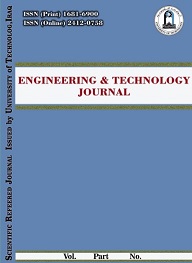Abstract
Produced water (PW) is water that comes out of the well with the crude oil during crude oil production. A well-known obstacle hindering the reuse of the produced water in different sectors is the high dissolved oxygen (DO) content as it can cause corrosion and polymer degradation. This study reports the experimental investigations for de-oxygenating samples of PW collected from Omani oil fields via a gas lift unpacked and packed column. Two types of packing (polyethylene rushing rings and spherical glass balls) were used. Upon treating the PW samples grafted with different concentrations of polyacrylamide; 100-500 ppm, through different purging techniques at various N2 throughputs, a considerable reduction in the content of the dissolved oxygen (from saturation level to less than 1 ppm) was detected in the first duration (3 minutes). Upon examining purging durations up to 300 minutes, the DO removal efficiency was slightly improved; however, residues of DO (approaching 0.5 ppm) were left unremoved, indicating the necessity for elaborating another approach for treating the shallow DO levels.
Keywords
Produced water treatment; Dissolved oxygen; N2 purging; Experimental design; Packed column.
